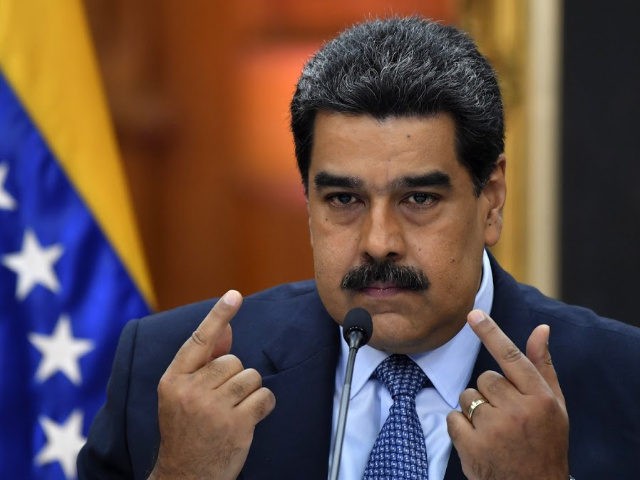The U.S. State Department announced late Wednesday that it would maintain a diplomatic presence in Venezuela despite dictator Nicolás Maduro’s demand that they leave, stating that, as Venezuela swore in a new president who does not wish to break diplomatic ties, Maduro has no power to expel the Americans.
Venezuela experienced massive protests on Wednesday, the anniversary of the 1958 establishment of a democratic representative government, attracting thousands denouncing socialist tyranny in most of the nation’s biggest cities. At the heart of the protests in Caracas, Juan Guaidó, then the head of the nation’s federal legislature, took an oath of office to become the country’s interim president.
The Venezuelan constitution allows for such a move in the event of a rupture of the diplomatic order, as in the case of Maduro holding fraudulent elections on multiple occasions to remain in power.
Maduro responded to the protests by claiming an American coup d’etat was underway and stating that all American diplomatic personnel had 72 hours to leave the country.
In response, Secretary of State Mike Pompeo issued a statement that Washington would disregard Maduro entirely, as he was no longer the head of state of Venezuela.
“The United States stands with interim President Juan Guaidó, the democratically elected National Assembly, and the people of Venezuela as they peacefully restore constitutional order to their country,” the statement read. “We welcome interim President Guaidó’s directive to all diplomatic missions in Venezuela that Venezuela intends to maintain diplomatic relations with all countries.”
“The United States maintains diplomatic relations with Venezuela and will conduct our relations with Venezuela through the government of interim President Guaidó, who has invited our mission to remain in Venezuela,” the State Department noted.
As for Maduro:
The United States does not recognize the Maduro regime as the government of Venezuela. Accordingly, the United States does not consider former president Nicolás Maduro to have the legal authority to break diplomatic relations with the United States or to declare our diplomats persona non grata.
Pompeo concluded with a call to the Venezuelan military to avoid taking orders from Maduro that would result in violence against dissident civilians and to “refrain from measures that are inconsistent with the privileges and immunities enjoyed by members of the diplomatic community.”
Maduro issued a speech on the balcony of Miraflores, the presidential palace, on Wednesday announcing that his regime would no longer allow the presence of any U.S. government representatives on Venezuelan soil.
“I have decided to cut all diplomatic ties with the imperialist government of the United States,” he announced. “Get out of Venezuela, enough is enough! There is dignity here, damn it!”
Maduro went on to claim that Guaidó was a “puppet” of the United States and was “chosen” by the American elite, not the Venezuelan people. Guaidó himself has stated that he is merely an “interim” figure tasked with organizing free and fair elections to replace Maduro.
Ante la extrema insolencia imperial, que pretende imponer en nuestra Patria un gobierno títere y servil, he dado 72 horas a todo el personal diplomático y consular de los EE.UU. para que abandonen el País. ¡Venezuela se Respeta! #YankeeGoHome pic.twitter.com/TWkL2827ar
— Nicolás Maduro (@NicolasMaduro) January 23, 2019
Guaidó immediately issued a statement following Maduro’s speech urging American diplomats to disregard his rantings. Addressed to all intenrational embassies, Guaidó’s statement affirmed that “the State of Venezuela firmly wishes to maintain your diplomatic presence in our country.”
“As such, I request that you do not recognize any order or decree that contradicts the firm wishes of the legitimate power in Venezuela … to see diplomatic missions, their charges d’affairs, and all their personnel continue to oerate in Venezuela noramlly and that all their immunities and privileges be respected.”
#Comunicado para todas las Embajadas presentes en Venezuela.
Responsablemente les digo que somos una nación soberana y seguiremos manteniendo las relaciones diplomáticas con todos los países del mundo.
Seguimos firmes en retomar el Orden Constitucional. pic.twitter.com/CeNlOtdJw2
— Juan Guaidó (@jguaido) January 24, 2019
The United States joined a chorus of diplomatic nations including Canada, Brazil, Colombia, Perú, Georgia, Kosovo, Chile, and Ecuador in recognizing Guaidó’s authority over Maduro’s. Supporting Maduro are some of the world’s most repressive regimes, including Cuba, Turkey, Russia, and Bolivia. The socialist government of Mexican President Andrés Manuel López Obrador, who once illegally “inaugurated” himself president after losing a free election in 2006, also refused to recognize Guaidó.
Guaidó, while offered international legitimacy, does not yet appear to have control of the military or the National Guard, which Maduro began using last night to arrest, assault, and kill civilians who participated in the protests. One Venezuelan monitor group estimates that over 200 people have been arrested this week for political disobedience. Official death counts stand at between 14 and 17 people, most men in their 20s, though the ages of the known victims range between 19 and 47. Only one known victim is a woman.

COMMENTS
Please let us know if you're having issues with commenting.